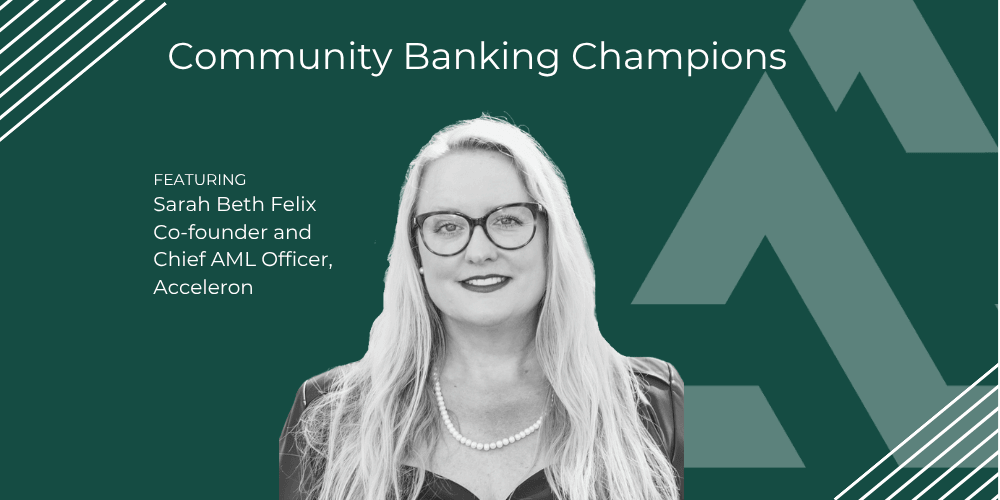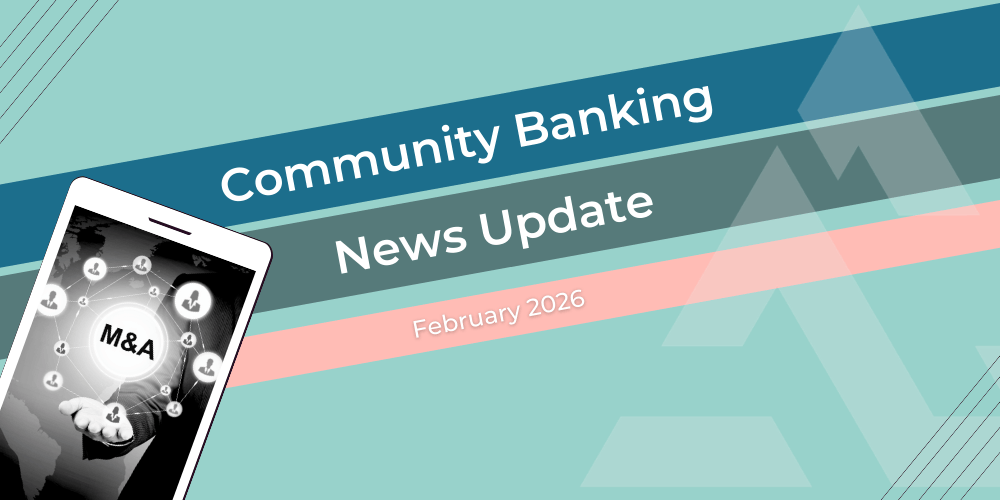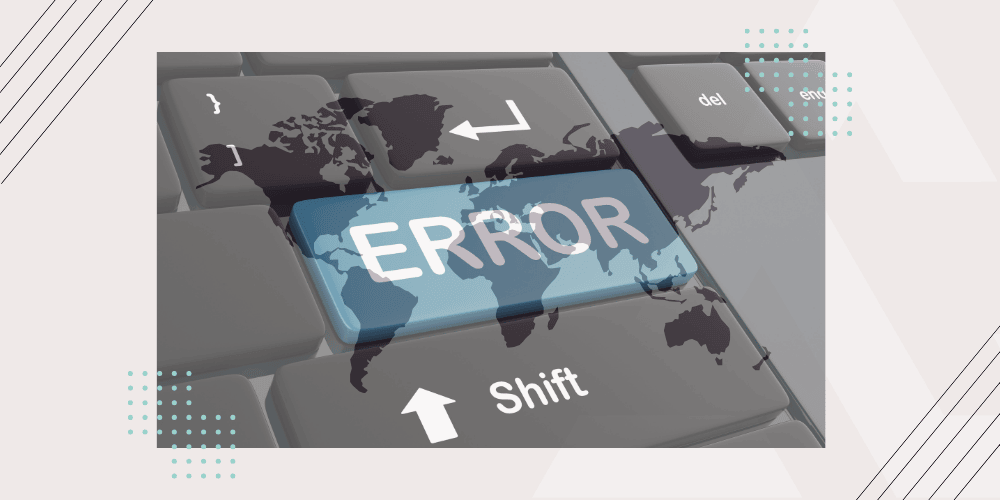The Exchange Newsletter - February 2026
This month's must-knows on bank charter momentum, ISO 20022 friction, and modern correspondent banking strategy As we move into 2026, it feels like...
4 min read
 Daisy Lin, Head of Marketing, Acceleron
:
6/5/25 9:21 AM
Daisy Lin, Head of Marketing, Acceleron
:
6/5/25 9:21 AM

Sarah Beth Felix didn’t set out to become one of the foremost experts in anti-money laundering (AML) compliance, but that’s exactly what happened. A fourth-generation Floridian, she began her career with a passion for business, a knack for pattern recognition, and a sharp instinct for identifying financial anomalies. Over two decades, that instinct turned into a track record of helping banks to clean up compliance failures and navigate complex regulatory challenges. Now, as Co-Founder and Chief AML Officer of Acceleron, Felix is building the kind of compliance-first financial institution she long wished existed, one that raises the bar for AML and sanctions while helping community banks stay profitable and protected. She talked with the Illicit Edge podcast about her unconventional journey. Here are some excerpts from that conversation, edited for length and clarity. Watch the full conversation here.
I’m a beach girl at heart, born and raised in Tampa, on a little beach just west of the city that my great-grandmother also lived on. But I’ve lived all over.
I always wanted to be a businesswoman. My dad was a tech exec, and I admired that. I had no clue what that looked like, and then I really got into the stock market and pursued an international business degree with a minor in Spanish and lived in Costa Rica. Then I decided to get licensed as a stockbroker and took my Series 7 license exam, right around September 11. That day changed everything. I got into fraud and risk management working for the world’s largest check processor, dealing with multimillion-dollar fraud rings. That’s where I got my first taste of money laundering investigations and I got to work with federal law enforcement agencies that were going after them. I just never looked back.
In 2005, I was living in Alaska and worked with a bank that had received an early regulatory order to comply with the first iteration of the AML exam manual. The manual had just come out, almost 400 pages, and banks had to operationalize the Patriot Act for the first time so that we don’t have another September 11. I discovered I was really good at speed-operationalizing: distilling information quickly, working under tight deadlines, rallying teams across departments. When you’re looking at an examiner’s report and you’re able to read between the lines and think very quickly about the most efficient and effective way for financial institutions to remediate the gaps in a consent order - that’s a valuable skill that pays off every time.
Hands down, it’s the risk assessment, or rather, the lack of a threat-focused one. A lot of institutions are running on what I call "feelings sprinkled with facts." The private sector has been slow to adopt the threat terminology used in intelligence, military, and law enforcement. If you’re not looking at your institution like an illicit actor would, you’re missing the point.
Think about it: If I wanted to move illicit funds through your bank or credit union, what products would I use? Where are the vulnerabilities? That’s the lens you need. Without it, you end up with under-resourced teams, poor tech decisions, and onboarding high-risk clients you shouldn’t.
A hyper-suspicious one. I’ve spent years observing and collecting data informally, and now formally through psychometric evaluations at my company Hyper-S Research. Traits like curiosity and gut instinct are hardwired. You can’t teach a 28-year-old to be curious if they’re not already. You need people who look at a customer profile and immediately feel like “something’s off.” That mindset is more important than a degree in criminal justice.
Look at the public case involving Jeffrey Epstein’s bank. Analysts received alerts on his activity and dismissed them as him just helping young women with college expenses, despite the fact he was already a known name in the financial crime world. That’s the danger of projecting your own goodness onto suspicious activity.
Yes, with caveats. We’ve identified 17 traits that make up the hyper-suspicious profile. Cynicism is one, but not the “sky is falling” kind. You need people who don’t see the world through rose-colored glasses, but also don’t get stuck in negativity. You want measured suspicion, paired with traits that help them work effectively.
It started with frustration. In 2015–2016, we saw mass de-risking of foreign financial institutions, especially in the South Pacific and Caribbean. Big banks exited those relationships, and nobody took responsibility. I was trying to play matchmaker between small U.S. community banks and foreign institutions to help them access the U.S. financial system. It wasn’t sustainable.
So in 2018, I met my co-founder Damon Magnuski, and I told him: “I want to start a bank, one that focuses solely on banking financial institutions and doing AML and sanctions compliance right.” The regulators weren’t ready for that at the time, so we started by building a platform to serve U.S. institutions. Our goal now is to help U.S. community banks and credit unions handle international payments compliantly and profitably while raising the AML bar for the whole system.
That I can’t fix everything. I like to help. Someone the other day called me “Fix-It Felix.” But I had to learn boundaries. Not every problem is mine to solve. You have to pick your horse. Mine is AML and sanctions. And even within that, I have to stay focused or risk burning out. I tell my daughter: “Don’t move your fence into someone else’s yard.”
Don't be afraid to burn it down and start over. Not literally, but think in terms of a controlled burn. Reimagine your entire AML program: If you didn’t inherit that old risk assessment or those outdated procedures, what would you build today? That kind of thinking can change everything.
You can listen to Sarah Beth’s podcast “FinCrime Unfiltered” on Illicit Edge’s channel on Spotify, Apple, or YouTube.
Subscribe to our monthly newsletter, "The Exchange," to stay ahead of the curve and get original content and insights you won't find anywhere else!

This month's must-knows on bank charter momentum, ISO 20022 friction, and modern correspondent banking strategy As we move into 2026, it feels like...

Key regulatory, policy, and market shifts community banks and credit unions should be watching These are extraordinary times for the banking...

Common international wire failure points and how international payment automation can reduce errors to under 1% In 1871, Western Union introduced...